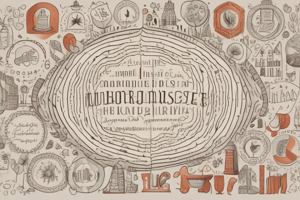Podcast
Questions and Answers
What is the primary language spoken in Germany, Austria, and Switzerland?
What is the primary language spoken in Germany, Austria, and Switzerland?
- French
- Italian
- English
- Deutsch (German) (correct)
How many cases are there in German grammar?
How many cases are there in German grammar?
- Two
- Three
- Four (correct)
- Five
What is the typical word order in German sentences?
What is the typical word order in German sentences?
- Subject-Object-Verb (SOV)
- Object-Verb-Subject (OVS)
- Subject-Verb-Object (SVO) (correct)
- Verb-Subject-Object (VSO)
What type of words are 'Haus' and 'Wasser' examples of?
What type of words are 'Haus' and 'Wasser' examples of?
Which dialect of German is spoken in Switzerland, Austria, and southern Germany?
Which dialect of German is spoken in Switzerland, Austria, and southern Germany?
What is the earliest form of the German language?
What is the earliest form of the German language?
What is the ranking of German in terms of languages taught worldwide?
What is the ranking of German in terms of languages taught worldwide?
What is a characteristic of the German language?
What is a characteristic of the German language?
Flashcards are hidden until you start studying
Study Notes
Deutsch (German) Language
Overview
- Deutsch is a West Germanic language spoken primarily in Germany, Austria, Switzerland, and several other European countries.
- It is the official language of Germany, Austria, and Switzerland, and one of the 24 official languages of the European Union.
Grammar
- German grammar is complex, with four cases: nominative, accusative, genitive, and dative.
- Verbs are conjugated according to tense, mood, and person.
- Word order is typically subject-verb-object (SVO), but can be flexible.
Vocabulary
- German vocabulary is composed of:
- Native Germanic words (e.g., Haus, Wasser)
- Latin loanwords (e.g., Kapitel, Universität)
- French loanwords (e.g., Kultur, Restaurant)
- English loanwords (e.g., Computer, Weekend)
Dialects
- There are several dialects of German, including:
- High German (Hochdeutsch): the standard language used in writing and formal speech.
- Low German (Plattdeutsch): spoken in northern Germany and the Netherlands.
- Alemannic: spoken in Switzerland, Austria, and southern Germany.
- Bavarian: spoken in southern Germany and Austria.
History
- Old High German (8th-11th centuries): the earliest form of the German language.
- Middle High German (11th-14th centuries): the language of medieval German literature.
- Early New High German (14th-17th centuries): the emergence of modern German.
- Modern German (18th century onwards): the standardization of the language.
Interesting Facts
- German is the third most widely taught language in the world.
- German is the second most widely used language in the European Union.
- The German language has a significant number of compound words, with some words consisting of over 30 letters.
Deutsch (German) Language
Overview
- Spoken primarily in Germany, Austria, Switzerland, and several other European countries.
- Official language of Germany, Austria, and Switzerland, and one of the 24 official languages of the European Union.
Grammar
- Four cases: nominative, accusative, genitive, and dative.
- Verbs are conjugated according to tense, mood, and person.
- Typical word order is subject-verb-object (SVO), but can be flexible.
Vocabulary
- Composed of native Germanic words, Latin loanwords, French loanwords, and English loanwords.
- Examples of native Germanic words: Haus, Wasser.
- Examples of Latin loanwords: Kapitel, Universität.
- Examples of French loanwords: Kultur, Restaurant.
- Examples of English loanwords: Computer, Weekend.
Dialects
- High German (Hochdeutsch): standard language used in writing and formal speech.
- Low German (Plattdeutsch): spoken in northern Germany and the Netherlands.
- Alemannic: spoken in Switzerland, Austria, and southern Germany.
- Bavarian: spoken in southern Germany and Austria.
History
- Old High German (8th-11th centuries): earliest form of the German language.
- Middle High German (11th-14th centuries): language of medieval German literature.
- Early New High German (14th-17th centuries): emergence of modern German.
- Modern German (18th century onwards): standardization of the language.
Interesting Facts
- Third most widely taught language in the world.
- Second most widely used language in the European Union.
- German language has a significant number of compound words, with some words consisting of over 30 letters.
Studying That Suits You
Use AI to generate personalized quizzes and flashcards to suit your learning preferences.




